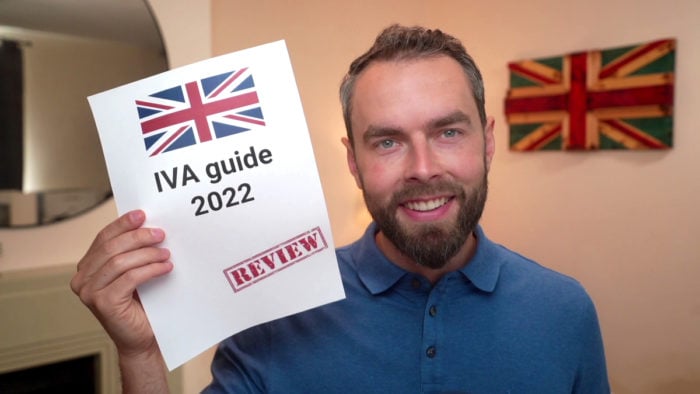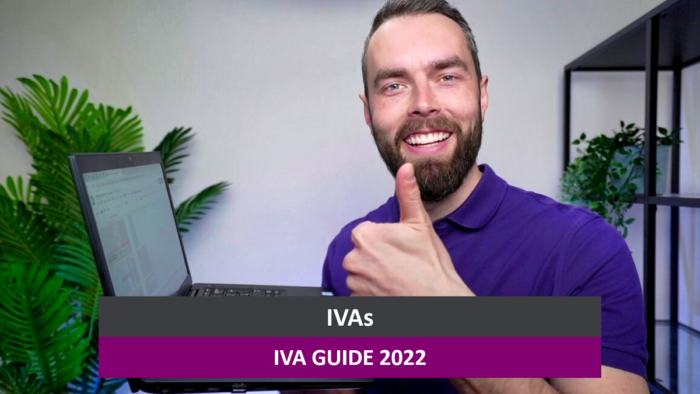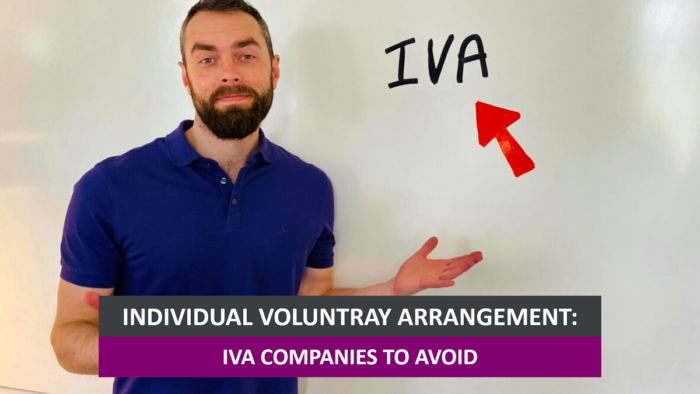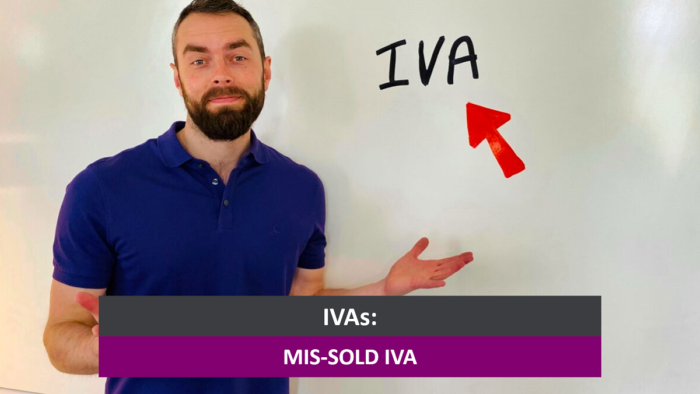IVA Guide
For free & impartial money advice you can visit MoneyHelper. We work with The Debt Advice Service who provide information about your options. This isn’t a full fact-find, some debt solutions may not be suitable in all circumstances, ongoing fees might apply & your credit rating may be affected.

For free & impartial money advice you can visit MoneyHelper. We work with The Debt Advice Service who provide information about your options. This isn’t a full fact-find, some debt solutions may not be suitable in all circumstances, ongoing fees might apply & your credit rating may be affected.
If you want to learn more about IVAs, you’re in the right place. Each month, more than 170,000 people visit us for advice on managing debt. We know the IVA process can seem confusing, and paying off debt might feel hard. But don’t worry; you’re not alone.
In this easy guide, we’ll help you understand:
- Why IVAs can be helpful for handling debt.
- The steps to set up an IVA.
- How long an IVA lasts.
- If an IVA is the best choice for you.
- Other options, like debt consolidation.
Our team is made up of people who have dealt with debt in the past, so we get how hard it can be and we’re here to help. Let’s get started.
How do I set up an IVA?
An Individual Voluntary Arrangement can only be pulled together with a qualified firm, it is not something that can be agreed upon just between a creditor and a person in debt. To set up an IVA, you will need to contact an IVA company, who can draw up the contract for you and check that you are eligible for it.
IVA companies are professionals who are qualified to give advice for any aspect of financial ruin or bankruptcy. They are the perfect financial professional to speak to about an Individual Voluntary Arrangement and will be able to properly aid you in setting up your IVA with your creditors.
Given how intensive this process is, it’s always a great idea to find someone who is friendly, easy to work with, and well-reviewed. Ask for recommendations from friends and family or seek advice from your local council or Citizen’s Advice Bureau (or similar).
What is the criteria for an IVA?
To start off, other than having debt that you are struggling to pay, you should know that you will need approximately £100 spare each month that you can use to pay your creditors. It’s unlikely that a creditor will be willing to sign an Individual Voluntary Arrangement if the individual cannot pay a substantial amount back to them, even though it may be a fair bit less than they were originally asking for. £100 shows that you have the finances to start paying back what you owe, without leaving you in a bad situation.
However, IVAs can be flexible. The IVA company will be able to help you look through your finances to discover how much money you can spare each month after essentials. They can also help you figure out how to increase the money you have spare each month from your income.
Those looking to sign an Individual Voluntary Arrangement will also need regular income that can be easily predicted. An individual whose income fluctuates, or someone who does not earn from a job, may not be able to get an IVA.
IVAs also take into account any assets a person owns, as well as their pension if they are over 55. If you’re a homeowner, then you should be made aware that many IVAs will require that you have a professional valuate your home during the last year of your agreement. You may be required to re-mortgage your property for the IVA, depending on your circumstances.
How long does an IVA last?
The typical IVA agreement will arrange can last up to five years, though some creditors might be willing to go as high as six years. Reading that, you may not be certain that you can afford to make enough repayments to pay back what you owe in that time. If that’s the case, then you might be interested to know another clause of an IVA: Once the agreement’s time is up, if you have not completed your repayments, any debt you owe is wiped.
At least three-quarters of your debt, no matter how many creditors you owe, must be in agreement to the IVA’s terms and conditions. For example, if you owe £20,000, the creditors of £15,000 of that debt must agree that they’re happy to go forward with an IVA. Once that happens, you will be completely eligible to the terms of an IVA, and subject to the conditions that you and your creditors agree on.
Why are IVAs useful?
An Individual Voluntary Arrangement would be useful to any person or persons who have found themselves with such a large financial debt that they cannot find a way out of the hole they’re in. Once you have an IVA in place for your creditors, they cannot contact you regarding your debt and repayments, unless you have missed a payment agreed upon by the IVA.
Everyone can sympathise with how stressful constant calls and requests for money that you don’t have can be. An IVA can put a stop to that, by helping you and your creditors come to an agreement about how much you can actually afford to pay, and how long it will take you to pay them back.
Don’t worry, here’s what to do!
There are several debt solutions in the UK, choosing the right one for you could write off some of your unaffordable debt, but the wrong one may be expensive and drawn out.
Fill out the 5 step form to find out more.
Is an IVA the right thing for me?
For someone who is struggling to make repayments to their creditors, it may seem like there isn’t a way out or a light at the end of the tunnel. An IVA ensures that you don’t pay more than you can afford, which means that you can keep your home running and food on the table. Debt can feel like a struggle no matter how much you owe, but for those owing £15,000 or more, it can be life-changing and daunting to pay back money that you just don’t have.
In this situation, an IVA could be the best solution for you. For a homeowner who has tried absolutely everything else possible to clear their existing debt, an IVA will allow you to negotiate with the creditors that you owe; until you reach an agreement which benefits all involved parties.
Any person considering doing an IVA should be made aware that they cannot borrow from any other financial lenders during the period of their IVA or until their debt is cleared. An IVA will be noted on your existing credit history file for exactly 12 months after it has cleared. This does make it much more difficult to borrow after your debt is dealt with, but it does mean that you won’t be in debt anymore, so you can start to spend smarter and rebuild your credit in the best way.

Paying your way to an IVA
An IVA does need to be paid for to be set up because the agreement is overseen by the IVA company, who has lawyers or an accountants. Depending on the particulars an IVA can cost around £5,000, though they can be as low as £2,000. An IVA is usually seen as a last resort; an attempt to show creditors the real financial situation that you’re in, but isn’t inexpensive to employ.
Some Insolvency Practitioners will ask for their fee payment before they will begin setting up the Individual Voluntary Arrangement between you and your creditors, while others will take the fees as part of the repayments that you make.
With an IVA, you don’t pay your creditors directly, as such. You make a payment each month into the IVA, itself, and that is paid to your creditors. By doing this, your IVA company can take their fees the same way your creditors take the money they’re owed. In a way, the IVA company becomes another creditor that you owe money to.
Always ask for quotes from several Insolvency Practitioners before you make your final decision if they are right for you. Find the best fees and arrangements for you and try to attend an initial meeting with each one so that they can understand your situation before they work with you.
Does an IVA mean bankruptcy?
The short answer is no. An Individual Voluntary Arrangement is extremely different to bankruptcy and could even be considered a solution to applying for bankruptcy. Though bankruptcy and IVAs are both kinds of insolvency, bankruptcy involves all of your assets being sold to pay off the debt you owe, while an IVA gives you the time you need to get your affairs in order and start paying off your debt without everything being sold.
Bankruptcy can be applied for by an individual who is in a large amount of debt, or a creditor can force a person into bankruptcy if you owe them a substantial amount of money. To do this, the creditor would apply for you to be declared bankrupt, rather than you applying to be considered as such.
IVAs are applied for when a person owes at least £15,000, while bankruptcy can be considered when you owe a creditor at least £750; which is much lower. Bankruptcy lasts for just a year but will remain noted on your credit history file for six more years. Similarly, an IVA can last for up to six years, and will remain on your credit history file for an additional year after the end of the agreement.
If you qualify for an IVA, it is almost always the preferred solution. An IVA allows you to pay back a set amount every month and does not require the sale of your property or assets. Bankruptcy is much harsher, and requires that all possible, non-essential assets (within reason) are sold to pay off the debt that you owe.
At the end of an IVA, if you haven’t managed to pay back what you owe, but have remained up to date with your repayments, your remaining debt is wiped off. Both bankruptcy and IVAs are solutions to financial hardship where you owe creditors a substantial amount of money, but an IVA is preferable because it’s much more manageable.
Your responsibilities
Your main responsibilities, in regard to your Individual Voluntary Arrangement, is to keep up with your repayments. If you do not manage to keep on top of your repayments, then your Insolvency Practitioner is completely within their rights to cancel your IVA.
Once your Individual Voluntary Arrangement begins, it will be listed in an online database that is accessed by agencies that need to check your credit rating and history. An IVA does affect your credit rating for up to a year after you clear your debt, which can make it more difficult for you to open new financial accounts or take out financial products. However, there are so many benefits to taking out an IVA as a solution to your debt.
The benefits
An Individual Voluntary Arrangement can help you settle your overwhelming debt with any and all of your creditors, while ensuring that your debt is cleared after the contracted period – as long as you keep up with your repayments.
As an IVA is set up through an Insolvency Practitioner, you will not need to contact or pay your creditors yourself. The company will set up the IVA for you to pay in to, and they can also contact your creditors on your behalf.
Once your IVA is in place, none of your creditors can take any legal action against you. They cannot take you to court, and they cannot apply to make you bankrupt. Any and all interest or additional charges are also stopped. You only pay back what you can afford to, and you only pay back what you want.
If nothing else, an Individual Voluntary Arrangement will enable you to redesign how you save and manage your finances. The first step is usually looking at your budget, checking your incoming finance and your outgoings, and figuring out exactly what you can afford to repay to each of your creditors. With the help of a great Insolvency Practitioner, any struggling individual or family can get back on track with ease.

